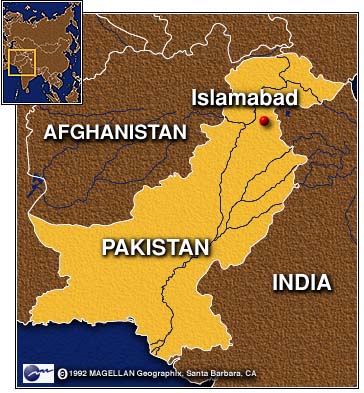
Let us compare two New York Times reports. First, October 2001 report: “Pakistan’s intelligence service has had a longstanding relationship with Al Qaeda, turning a blind eye to growing ties between Osama bin Laden and the Taliban.” Second, August 2008: “American intelligence agencies have concluded that members of Pakistan’s powerful spy service (ISI) helped plan the deadly July 7 bombing of India’s embassy in Kabul, Afghanistan, according to United States government officials.”
Two senior Indian diplomats were among 58 people killed in the July 7 attacks.
India has been pointing out the subversive role of Pakistan’s intelligence agency, the ISI, for the past three decades and its active encouragement of terrorism. Periodically the US administration agrees about the nefarious role of the ISI. But then again goes off to sleep. And imagine that all this relates to America’s “closest ally in it’s fight against terrorism”!!! This is a theatre of the absurd, what else!!!
Interestingly, the NYT’s latest report about revelations regarding ISI came at a time when Pakistan prime minister was in Washington shaking hands with President George W. Bush. As a diplomatic move, Pakistan had announced on the eve of the prime minister’s visit to the US that the wings of the ISI have been clipped (see here…).
So while knowing all along that the ISI has played a tricky role with the blessings of the Pakistan presidents, why is it the US not prepared to call a spade a spade? Is it because the ISI knows too much about sensitive matters and the US administration is not ready to dismount the tiger? It seems that it is easier to remove a particular president or a leader in Pakistan but not tamper with the functioning of the ISI.
Let me quote two paras from the latest NYT report: “The conclusion (about ISI’s involvement) was based on intercepted communications between Pakistani intelligence officers and militants who carried out the attack (on Indian embassy in Kabul), the officials said, providing the clearest evidence to date that Pakistani intelligence officers are actively undermining American efforts to combat militants in the region.
“The American officials also said there was new information showing that members of the Pakistani intelligence service were increasingly providing militants with details about the American campaign against them, in some cases allowing militants to avoid American missile strikes in Pakistan’s tribal areas.” More here…
(Meanwhile Pakistan denies the NYT report.)
Swaraaj Chauhan describes his two-decade-long stint as a full-time journalist as eventful, purposeful, and full of joy and excitement. In 1993 he could foresee a different work culture appearing on the horizon, and decided to devote full time to teaching journalism (also, partly, with a desire to give back to the community from where he had enriched himself so much.)
Alongside, he worked for about a year in 1993 for the US State Department’s SPAN magazine, a nearly five-decade-old art and culture monthly magazine promoting US-India relations. It gave him an excellent opportunity to learn about things American, plus the pleasure of playing tennis in the lavish American embassy compound in the heart of New Delhi.
In !995 he joined WWF-India as a full-time media and environment education consultant and worked there for five years travelling a great deal, including to Husum in Germany as a part of the international team to formulate WWF’s Eco-tourism policy.
He taught journalism to honors students in a college affiliated to the University of Delhi, as also at the prestigious Indian Institute of Mass Communication where he lectured on “Development Journalism” to mid-career journalists/Information officers from the SAARC, African, East European and Latin American countries, for eight years.
In 2004 the BBC World Service Trust (BBC WST) selected him as a Trainer/Mentor for India under a European Union project. In 2008/09 He completed another European Union-funded project for the BBC WST related to Disaster Management and media coverage in two eastern States in India — West Bengal and Orissa.
Last year, he spent a couple of months in Australia and enjoyed trekking, and also taught for a while at the University of South Australia.
Recently, he was appointed as a Member of the Board of Studies at Chitkara University in Chandigarh, a beautiful city in North India designed by the famous Swiss/French architect Le Corbusier. He also teaches undergraduate and postgraduate students there.
He loves trekking, especially in the hills, and never misses an opportunity to play a game of tennis. The Western and Indian classical music are always within his reach for instant relaxation.
And last, but not least, is his firm belief in the power of the positive thought to heal oneself and others.
















